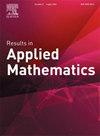基于高阶指数龙格-库塔离散化的离散ILQG方法
IF 1.3
Q2 MATHEMATICS, APPLIED
引用次数: 0
摘要
本文采用基于高阶指数龙格-库塔方法离散化的迭代线性二次高斯(ILQG)方法,对随机最优控制问题进行数值求解。在弱收敛意义下,导出了一种具有加性噪声的均方三阶格式,并给出了相应的阶条件。由于阶条件的分析是局部的,因此将分析转化为具有控制约束的离散问题的L∞误差估计。最后,通过ILQG方法计算节点控制来逼近全局控制律。数值实验进一步证明了ILQG在处理随机半线性控制问题时的显著稳定性。该方法具有简单、高效的优点。本文章由计算机程序翻译,如有差异,请以英文原文为准。
Discrete ILQG method based on high-order exponential Runge–Kutta discretization
In this study, we employ the iterative Linear Quadratic Gaussian (ILQG) method, discretized based on the high-order exponential Runge–Kutta methods, to numerically solve stochastic optimal control problems. In the sense of weak convergence, we derive a mean-square third-order scheme with an additive noise, and provide corresponding order conditions. As the analysis of order conditions is local, the analysis is transformed into a error estimate of the discrete problem with control constraints. Finally, the global control law is approximated by computing the node control via the ILQG method. The numerical experiment further demonstrates the significant stability of ILQG in dealing with stochastic semilinear control problems. The proposed approach presents the advantages of simplicity and efficiency.
求助全文
通过发布文献求助,成功后即可免费获取论文全文。
去求助
来源期刊

Results in Applied Mathematics
Mathematics-Applied Mathematics
CiteScore
3.20
自引率
10.00%
发文量
50
审稿时长
23 days
 求助内容:
求助内容: 应助结果提醒方式:
应助结果提醒方式:


